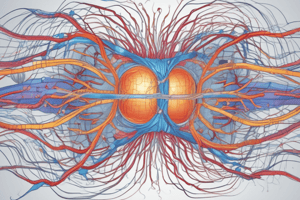Podcast
Questions and Answers
Neurons are electrochemical machines, and their excitability is determined by the balance of ______ and biochemical processes within the cell.
Neurons are electrochemical machines, and their excitability is determined by the balance of ______ and biochemical processes within the cell.
electrical
Synaptic transmission is the process by which neurons communicate with each other through the release of ______.
Synaptic transmission is the process by which neurons communicate with each other through the release of ______.
neurotransmitters
Feedback inhibition is a mechanism by which neurons provide their own inhibitory influence, often through the release of inhibitory ______ or the activation of inhibitory receptors.
Feedback inhibition is a mechanism by which neurons provide their own inhibitory influence, often through the release of inhibitory ______ or the activation of inhibitory receptors.
neurotransmitters
Flashcards are hidden until you start studying
Study Notes
Physiology: An Overview of Neurophysiology
Neurophysiology is a branch of physiology that focuses on the functions of the nervous system, specifically the functional properties of neurons, glia, and networks. It has historically been dominated by electrophysiology, which involves the electrical recording of neuronal activity, and has expanded to include various techniques from chemistry, physics, and molecular biology to study brain function. This article will provide an overview of the key aspects of neurophysiology.
Electrophysiology
Electrophysiology is a crucial aspect of neurophysiology, as it allows researchers to record and analyze the electrical activity of neurons. Techniques such as electroencephalogram (EEG) recordings and local field potentials (LFPs) are used to measure electrical activity in the brain. These methods provide valuable insights into the functioning of neurons and their role in various physiological processes.
Ion Channels
Ion channels are proteins embedded in the cell membrane that allow the passage of ions into and out of the cell. They play a crucial role in generating and conducting nerve impulses, and their dysfunction can lead to various physiological disorders. Neurophysiologists study the properties of ion channels, such as their role in generating action potentials and their influence on neuronal excitability.
Neuronal Excitability
Neurons are electrochemical machines, and their excitability is determined by the balance of electrical and biochemical processes within the cell. Neurophysiologists use various techniques, such as calcium imaging and functional magnetic resonance imaging (fMRI), to study these processes and understand how they contribute to brain function.
Synaptic Transmission
Synaptic transmission is the process by which neurons communicate with each other through the release of neurotransmitters. This process is essential for the propagation of nerve impulses and the integration of information within the nervous system. Neurophysiologists study the properties of synaptic transmission, including the role of neurotransmitters, receptors, and ion channels in this process.
Feedback Inhibition
Feedback inhibition is a mechanism by which neurons provide their own inhibitory influence, often through the release of inhibitory neurotransmitters or the activation of inhibitory receptors. This process is crucial for maintaining the balance of excitation and inhibition within the nervous system and preventing excessive or sustained neuronal activity. Neurophysiologists investigate the role of feedback inhibition in various physiological and pathological conditions.
In conclusion, neurophysiology is a diverse and rapidly evolving field that encompasses various techniques and approaches to study the function of the nervous system. By understanding the properties of neurons, glia, and networks, neurophysiologists contribute to our comprehension of the complex workings of the human brain and nervous system.
Studying That Suits You
Use AI to generate personalized quizzes and flashcards to suit your learning preferences.




